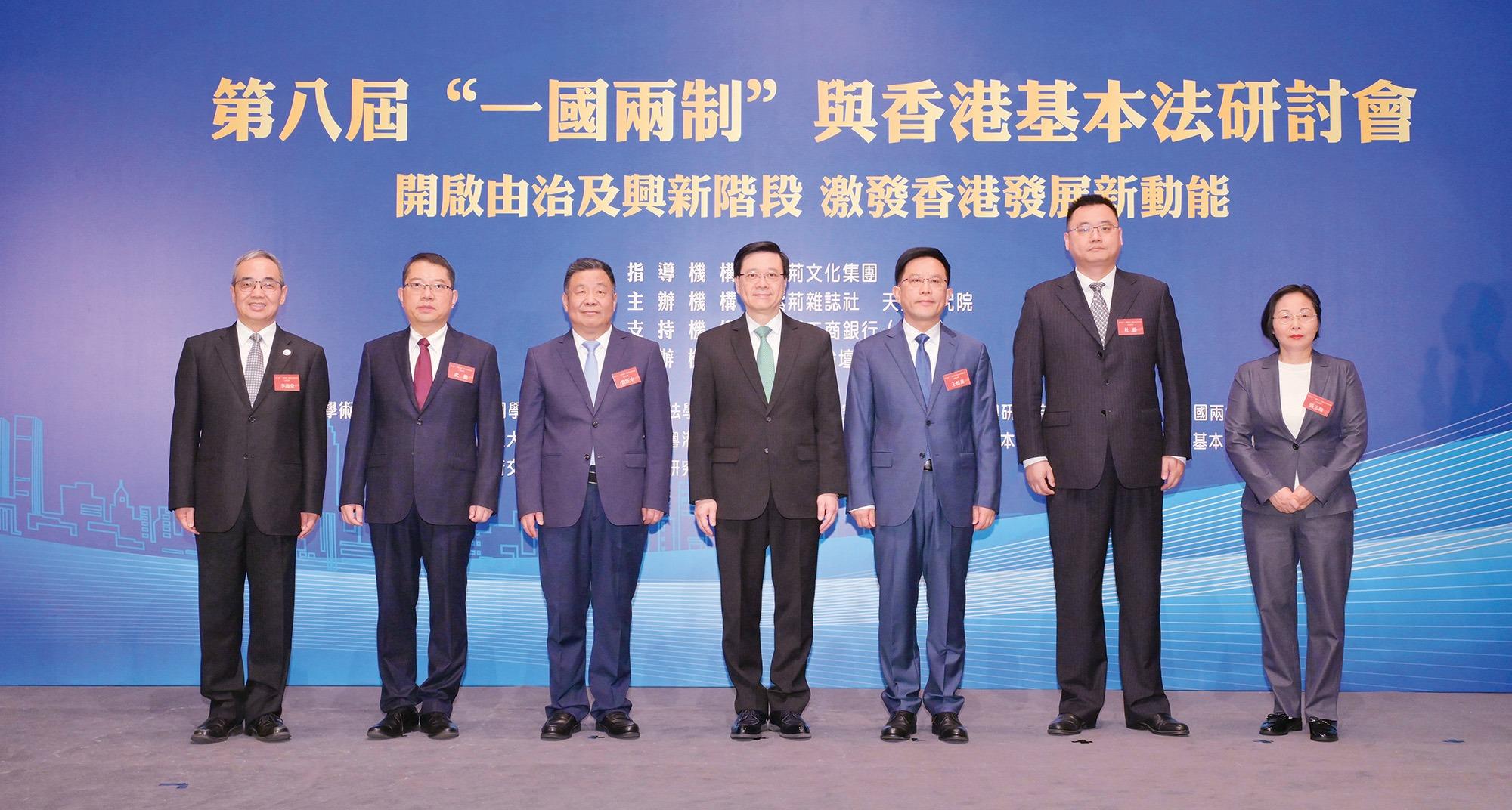Lee to step up push to promote success of ‘one country, two systems’ principle
 Hong Kong Chief Executive John Lee Ka-chiu (center) joins guests of honor to officiate at Thursday’s symposium on “one country, two systems” and the Basic Law in Hong Kong. (PHOTO PROVIDED TO CHINA DAILY)
Hong Kong Chief Executive John Lee Ka-chiu (center) joins guests of honor to officiate at Thursday’s symposium on “one country, two systems” and the Basic Law in Hong Kong. (PHOTO PROVIDED TO CHINA DAILY)
To spur development and achieve prosperity, the Hong Kong Special Administrative Region should better leverage the distinctive advantages offered by the “one country, two systems” framework, officials and law experts told a local forum on Thursday.
They suggested a slew of major initiatives, including firmly upholding the “one country, two systems” principle, enhancing governance, improving the mechanism for safeguarding national security, and actively seeking new opportunities arising from national strategies.
Hong Kong can only fully realize the vision of the Basic Law, maintain effective governance and preserve social stability by ensuring the steady and longterm implementation of ‘one country, two systems’.
John Lee Ka-chiu, Hong Kong chief executive
Speaking at the forum, Hong Kong Chief Executive John Lee Ka-chiu said that Hong Kong can only fully realize the vision of the Basic Law, maintain effective governance and preserve social stability by ensuring the steady and long-term implementation of “one country, two systems”.
With a stable environment, Hong Kong can leverage its unique advantages, such as a business-friendly environment, an efficient and transparent market, a robust financial system and a tradition of upholding the rule of law.
Lee also highlighted the separate customs territory status granted to Hong Kong by the Basic Law as another unique advantage.
The status enables the SAR to enter into agreements with countries and regions worldwide. To date, Hong Kong has signed 23 investment agreements with 32 economies and has established free-trade agreements with 20 economies.
Building on these strengths, the SAR will expand its global network, promote regional collaboration, and continue elevating its status as an international financial, trade, and shipping hub. This way, the city will contribute to the high-quality development of the country, Lee said.
He also pledged to double down on efforts to promote the achievements of “one country, two systems”, enabling other countries to better understand the SAR’s new developments and advantages.
Wang Songmiao, secretary general of the Liaison Office of the Central People’s Government in the HKSAR, said he expected Hong Kong to continue to harness its unique advantages and preserve and develop its common law system — an important advantage that guarantees Hong Kong its world-class, free and open business environment.
He said that upholding the common law system not only aligns with the principle of “one country, two systems”, but also serves as a vital component in maintaining Hong Kong’s unique position and advantages.
He noted that the city has nearly 15,000 local legal practitioners, along with more than 1,400 overseas lawyers recommended by 33 global jurisdictions. It also consistently features among the top rankings in global development indices.
These legal resources ensure a free market to stage standardized business activities. The institutional support of the legal sector can also better integrate the city into the national development, Wang said.
Elsie Leung Oi-sie, former deputy director of the Hong Kong Basic Law Committee under the Standing Committee of the National People’s Congress, encouraged Hong Kong to innovate and expand businesses to seek greater prosperity.
In the development of the Guangdong-Hong Kong-Macao Greater Bay Area, Hong Kong can play a greater role with its unique strengths and complement the nation’s edge, she said, adding that in commerce and service sectors, it’s necessary to explore new pathways to facilitate exchanges between the Chinese mainland and Hong Kong.
Lawmaker Priscilla Leung Mei-fun said that Hong Kong needs to demonstrate to the international community that the coexistence of socialism and capitalism under the “one country, two systems” framework can be a success, and lead by example.
While enjoying the favorable policies and status of its capitalist system, Leung noted Hong Kong has to address long-existing internal problems — such as narrowing the wealth gap and improving the well-being of its residents — to reach a new development level.
Chen Duanhong, director of the Institute for Hong Kong and Macau Studies of Peking University, said that for Hong Kong society, it is essential to bolster confidence in investors, provide a sense of security to the professional sector, and ensure fairness and a sense of achievement for the general public.
Internally, the SAR’s governance should also be further improved by ensuring the smooth and effective operation of executive, legislative and judiciary organs. Externally, the city needs to actively integrate into the country’s development and participate in the Belt and Road Initiative to explore new markets. It is also crucial to attract more talent and investment to the city, Chen added.


